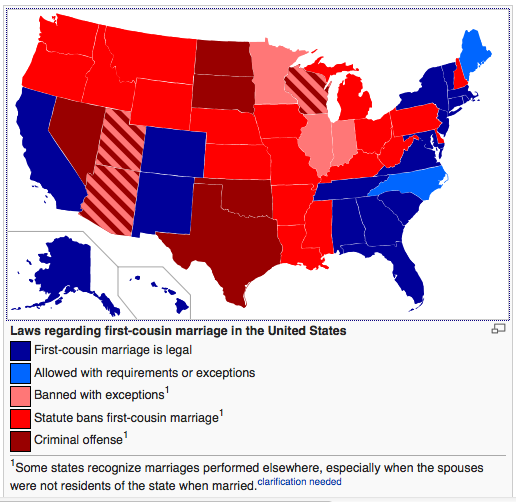“Oh, my Luve’s like a red, red, rose / That’s newly sprung in June,” wrote Robert Burns, and while it’s always sad when a poet doesn’t know how to spell an easy word like “love,” it’s undeniably true that June is the most romantic month of the year. To this day, it’s the most popular month for Americans to get married, just ahead of August and May. We’ve asked Ken Jennings, the famous Jeopardy! champion and relationship guru, to puncture four matrimonial myths that have stuck around for years, for richer, for poorer, in sickness and in health. If you’re not ready to have all your marital misconceptions shattered, speak now or forever hold your peace.

The Debunker: Is It Dangerous to Marry Your Cousin?
It was good enough for great scientists like Albert Einstein and Charles Darwin, not to mention literary geniuses like H. G. Wells and Charlotte Perkins Gilman and musical prodigies from Grieg to Stravinsky. I’m talking, of course, about the God-given privilege of marrying one’s first cousin. (If you’re opposed to the whole aunt-as-mother-in-law thing, I supposed you could alternatively point out that Carlo Gambino, Saddam Hussein, and Jesse James were cousin-cuddlers.)

First cousin marriage is restricted in thirty U.S. states, making us the only country in the developed world that doesn’t celebrate the sacred beauty of two near-siblings getting it on. Europe, Canada, Mexico, Japan—all big on cousin marriage. In fact, for centuries, it was standard practice among royalty. Cleopatra’s family tree was so inbred that one of her predecessors married a cousin who was also his half-sister and his stepmother! One Rutgers professors estimates that as many as 80 percent of all marriages in human history have been between first or second cousins.
But what about the birth defects? you probably want to know. Buzz kill! Let’s start with the good news: there is in fact no measurable rise in birth defects when second cousins procreate. For first cousins, according to a 2002 study by the National Society of Genetic Counselors, there’s a small increase. The risk of a serious genetic problem (spina bifida, for example, or cystic fibrosis) is 3-4 percent in an average birth. A pair of cousin parents adds another 1.7-2.8 percent of risk factor. That’s not optimal, sure, but cousin marriage advocates (yes, there is such a thing) point out that this is similar to the added risk factor of a woman giving birth when she’s in her forties, which we haven’t seen fit to criminalize. I can’t believe no social scientist has studied the advantages of cousin marriage. Just think: no fights over which set of in-laws to spend the holidays with!
Quick Quiz: On TV’s The Simpsons, what town near Springfield was founded so that early settlers could marry their cousins (because they were so attractive)?
Ken Jennings is the author of six books, most recently his Junior Genius Guides, Because I Said So!, and Maphead. He's also the proud owner of an underwhelming Bag o' Crap. Follow him at ken-jennings.com or on Twitter as @KenJennings.

